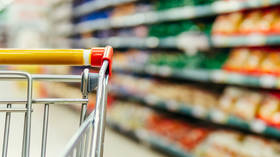Bank of England issues UK food price warning

Surging inflation which has been crippling the British economy may slow but food will remain more expensive than before the cost-of-living crisis, the Bank of England’s chief economist, Huw Pill, has warned.
Official figures show that food inflation in the world’s tenth-largest economy in terms of purchasing power parity (PPP) remained stubbornly high at 17.3% in the 12 months to June.
“Unfortunately, the days of seeing food prices fall, that does seem to be something that we may not be seeing for a little while yet, if in the future at all,” Pill was quoted as saying by Sky News on Monday.
According to the leading economist, the impact on food prices in the UK has been “a little bit more long-lasting than would have been expected.”
Pill cited uncertainty over the supply chain for staples such as wheat and sunflower oil as a result of the Ukraine conflict and Western sanctions on Russia, which has increased the cost of raw materials and basic food.
British companies have responded by locking themselves into expensive contracts, Pill argued, adding that price rises will begin to slow as those contracts come to an end and food sub-processors in the UK adjust to the end of supply disruption.
Consumer price growth in Britain has remained persistently high despite government efforts to tame inflation, with officials and trade unions accusing supermarkets of “greedflation” and profiteering at the expense of consumers. Pill previously stated that British households and businesses need to accept that they are now poorer, and should stop asking for wage increases and pushing prices higher.
“Some firms decided to sort of lock in their purchases of commodities in international markets in order to reduce that uncertainty, but potentially locked in at quite high levels of prices and they’re still passing that through the system into what ultimately we’re paying for in shops,” he explained.
For more stories on economy & finance visit RT's business section












